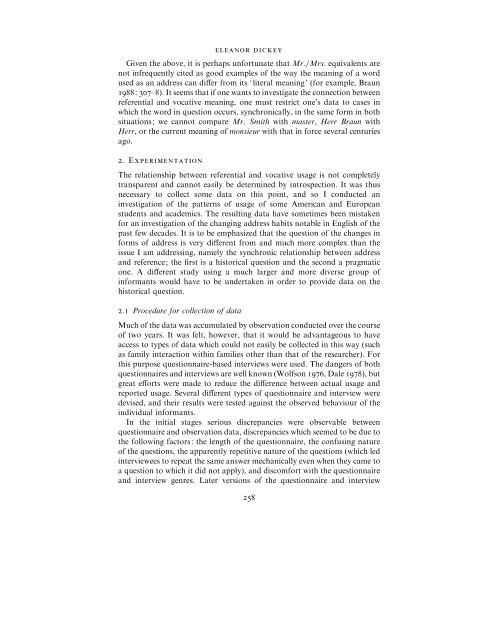Forms of address and terms of reference - Exeter Research and ...
Forms of address and terms of reference - Exeter Research and ...
Forms of address and terms of reference - Exeter Research and ...
Create successful ePaper yourself
Turn your PDF publications into a flip-book with our unique Google optimized e-Paper software.
eleanor dickey<br />
Given the above, it is perhaps unfortunate that Mr.Mrs. equivalents are<br />
not infrequently cited as good examples <strong>of</strong> the way the meaning <strong>of</strong> a word<br />
used as an <strong>address</strong> can differ from its ‘literal meaning’ (for example, Braun<br />
1988: 307–8). It seems that if one wants to investigate the connection between<br />
referential <strong>and</strong> vocative meaning, one must restrict one’s data to cases in<br />
which the word in question occurs, synchronically, in the same form in both<br />
situations; we cannot compare Mr. Smith with master, Herr Braun with<br />
Herr, or the current meaning <strong>of</strong> monsieur with that in force several centuries<br />
ago.<br />
2. Experimentation<br />
The relationship between referential <strong>and</strong> vocative usage is not completely<br />
transparent <strong>and</strong> cannot easily be determined by introspection. It was thus<br />
necessary to collect some data on this point, <strong>and</strong> so I conducted an<br />
investigation <strong>of</strong> the patterns <strong>of</strong> usage <strong>of</strong> some American <strong>and</strong> European<br />
students <strong>and</strong> academics. The resulting data have sometimes been mistaken<br />
for an investigation <strong>of</strong> the changing <strong>address</strong> habits notable in English <strong>of</strong> the<br />
past few decades. It is to be emphasized that the question <strong>of</strong> the changes in<br />
forms <strong>of</strong> <strong>address</strong> is very different from <strong>and</strong> much more complex than the<br />
issue I am <strong>address</strong>ing, namely the synchronic relationship between <strong>address</strong><br />
<strong>and</strong> <strong>reference</strong>; the first is a historical question <strong>and</strong> the second a pragmatic<br />
one. A different study using a much larger <strong>and</strong> more diverse group <strong>of</strong><br />
informants would have to be undertaken in order to provide data on the<br />
historical question.<br />
2.1 Procedure for collection <strong>of</strong> data<br />
Much <strong>of</strong> the data was accumulated by observation conducted over the course<br />
<strong>of</strong> two years. It was felt, however, that it would be advantageous to have<br />
access to types <strong>of</strong> data which could not easily be collected in this way (such<br />
as family interaction within families other than that <strong>of</strong> the researcher). For<br />
this purpose questionnaire-based interviews were used. The dangers <strong>of</strong> both<br />
questionnaires <strong>and</strong> interviews are well known (Wolfson 1976, Dale 1978), but<br />
great efforts were made to reduce the difference between actual usage <strong>and</strong><br />
reported usage. Several different types <strong>of</strong> questionnaire <strong>and</strong> interview were<br />
devised, <strong>and</strong> their results were tested against the observed behaviour <strong>of</strong> the<br />
individual informants.<br />
In the initial stages serious discrepancies were observable between<br />
questionnaire <strong>and</strong> observation data, discrepancies which seemed to be due to<br />
the following factors: the length <strong>of</strong> the questionnaire, the confusing nature<br />
<strong>of</strong> the questions, the apparently repetitive nature <strong>of</strong> the questions (which led<br />
interviewees to repeat the same answer mechanically even when they came to<br />
a question to which it did not apply), <strong>and</strong> discomfort with the questionnaire<br />
<strong>and</strong> interview genres. Later versions <strong>of</strong> the questionnaire <strong>and</strong> interview<br />
258
















